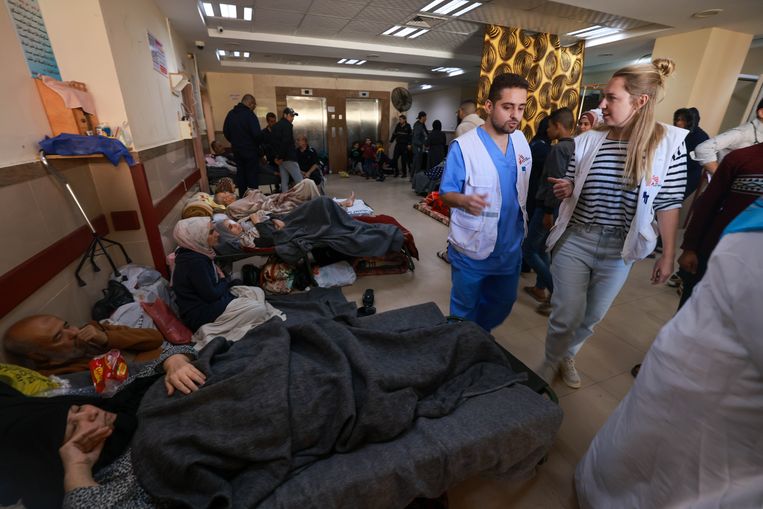“This is unprecedented.” Emergency nurse Catherine Claes has just returned from the Gaza Strip. It sent an MSF team of about 70 local health workers. “There is simply no safe meter in Gaza.”
Catherine Claes, 33, from Bruges, works as an emergency nurse but has been working full-time for MSF for several years. Claes has extensive experience, having led medical teams for NGOs in Yemen, Ethiopia and dozens of other countries. But nothing beats what she saw during five weeks in the Gaza Strip.
“The big difference between other conflicts is that people don’t have the opportunity to flee to a safe place,” she says. Sometimes an area that is supposed to be safe is bombed after a week. There is simply no safe meter in Gaza. invisible.”
The mission began in October after four tense weeks in Egypt awaiting clearance. Once across the border, the team went to Nasser Hospital in Khan Yunis, where they conducted a major needs analysis and began the project.
Was this possible in safe conditions?
“In the first two weeks in Khan Yunis, there were also bombings in the neighborhoods surrounding Al-Nasser Hospital, but after the ceasefire these bombings increased dramatically. We stopped the project there because it was too unsafe. A few days later, the maternity ward was bombed.
“We also supported a health center in Khan Yunis, which we had to leave ten days after the evacuation order was issued. This is a terrible thing to do. A medical facility should never be a target. We then moved to the center of the Gaza Strip, to Al-Aqsa Hospital in “Deir al-Balah. We worked there for three weeks until a new team arrived.”

Israel says Hamas uses hospitals as military sites. Did you notice anything about it?
“Not at all. All we saw were sick people. There were children who were the only ones left in a family of 60 people. Here they are: also having a fractured skull or other injury. The number of minors was enormous. Let me give the numbers: 25% of the patients who “Our wound care recipients were younger than 15. At the Khan Yunis health center, half of the patients were under 5.”
Was this center primarily focused on children?
“No, the living conditions are very bad. There are many children suffering from diarrhea, pneumonia or skin diseases, such as scabies and bacterial infections.
What was the situation like in Al-Aqsa Hospital?
“Normally there was space for 250 beds, but now there are 750 beds. These are only patients with injuries resulting from the bombing. There is no longer room for other patients, with heart disease, cancer or pregnancy. Primary health care has been canceled.” This concerns amputations, burns, head injuries, vertebral fractures, and those types of trauma.
“The worst thing is what we did not see: people who cannot get there, for example because they are under the rubble. Several times a day there were 'mass casualties', where many wounded would come at the same time, after heavy bombing.
“Patients were lying everywhere, on beds or on the floor, in the corridor or even outside the hospital. When we arrived at the hospital he was no longer administering wound care. The smell in the corridor and in the ward was unbearable, caused by rotting limbs, sometimes with worms and dead flesh.” .

Due to lack of care?
“Yes, because of the large number of patients and the lack of materials and organization. It is far from the Rafah border crossing, so it is difficult for food and other supplies to get there. Also, monitoring patients is very difficult if they are spread out everywhere.
“We set up a wound care tent where patients from inside and outside the hospital could go. We were treating about 150 wounds there every day. We also opened an operating room to care for painful wounds under general anesthesia.
“A team of psychologists organized sessions mainly targeting children and their parents. We were a team of three international colleagues from MSF and seventy nurses and doctors from the Gaza Strip, who had also previously worked for our organization. Most of them were health workers who had fled North.
I worked days from 6 a.m. until midnight. It must have been very difficult, or are you able to isolate yourself from the emotional side of things?
“No, you experience loss all the time, not just with patients, but also with staff who suddenly receive bad news. I remember one day we started comforting a nurse. She had just received a video of her sister dying. This was the daily reality. The streets were exposed “And the neighborhoods around the hospital were bombed. I worked with 60 to 70 staff, and I had to see every day who was there and who wasn't. Who didn't survive the night? Whose house was hit?”
I guess you also felt relieved when you returned to Egypt to return to Belgium?
“No, I can't call it relief, because our work there is very important. Plus it's difficult because you know another two million people can't leave. On the way back to Rafah, all I saw was rubble, and it was terrible. People are living in tents or The schools, in complete despair, have lost all hope and care only about survival.

“Lifelong food practitioner. Zombie geek. Explorer. Reader. Subtly charming gamer. Entrepreneur. Devoted analyst.”











More Stories
Revealing the ten countries that support Ukraine the most
Funny protest against mass tourism in Galician village
Kamala Harris has wind in her sails, but Trump can still win